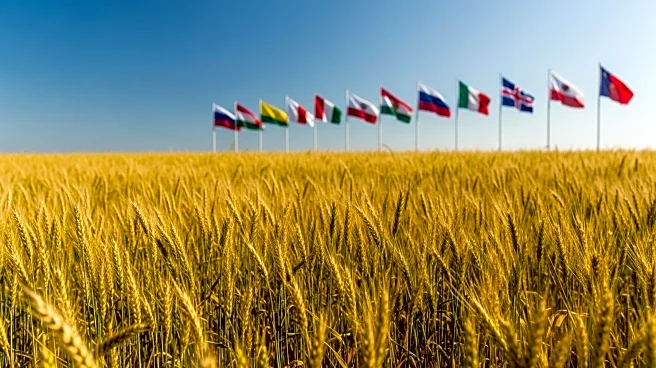What is the story about?
What's Happening?
The United States, historically a leader in global agricultural exports, is experiencing a significant shift as its farm trade balance moves into a deficit. A study conducted by the University of Illinois Urbana-Champaign and Texas Tech University reveals that U.S. agricultural imports now exceed exports, a trend projected to worsen. The agricultural trade deficit is expected to reach $49 billion by the end of 2025. Despite being a top producer of crops such as corn, soybeans, wheat, and cotton, U.S. exports are stagnating while imports, particularly fruits, vegetables, and canola oil, continue to rise. The ongoing trade dispute with China, which has imposed retaliatory tariffs on key U.S. exports, is a major factor contributing to this shift.
Why It's Important?
The growing agricultural trade deficit has significant implications for the U.S. economy and its agricultural sector. As imports surpass exports, American farmers face increased competition from foreign producers, potentially impacting their profitability and market share. The trade imbalance could lead to job losses in the agricultural sector and affect related industries such as transportation and logistics. Additionally, the trade dispute with China highlights vulnerabilities in U.S. trade policies and underscores the need for strategic adjustments to maintain competitiveness in global markets. Stakeholders, including policymakers and industry leaders, must address these challenges to support the agricultural sector and ensure its sustainability.
What's Next?
The U.S. government and agricultural industry leaders may need to explore new trade agreements and strategies to mitigate the impact of the trade deficit. Efforts to diversify export markets and reduce dependency on China could be crucial. Additionally, investments in technology and innovation may help U.S. farmers improve productivity and competitiveness. Monitoring the trade balance and adjusting policies to support domestic agriculture will be essential in the coming years. Stakeholders may also advocate for government support and subsidies to help farmers navigate the challenges posed by the trade deficit.
Beyond the Headlines
The shift in the U.S. agricultural trade balance may have broader implications for food security and sustainability. As imports increase, there could be a greater reliance on foreign food sources, raising concerns about supply chain stability and quality standards. The situation also highlights the importance of addressing environmental and ethical considerations in global trade practices. Long-term strategies may involve promoting sustainable farming practices and enhancing domestic production capabilities to reduce dependency on imports.















